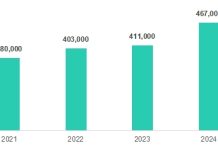The data lake market is set to grow from its current market value of more than US$15.2 Billion to over US$80.2 Billion by 2032, as reported in the latest study by Global Market Insights, Inc.
The market is witnessing a surge in demand fueled by burgeoning collaborations among industry leaders. As companies recognise the imperative of harnessing data for informed decision-making, partnerships emerge as catalysts for innovation and efficiency.
The data lake market from the services segment could exhibit a decent growth rate over 2023-2032, claims the report. As organizations strive for efficient data management and analytics, they increasingly rely on service providers for expertise in implementing and managing data lake solutions.
Services such as consulting, integration, maintenance, and support are crucial for ensuring the smooth operation and optimisation of data lakes. Thus, the services component emerges as a key driver in meeting the evolving demands of organizations seeking to harness the power of data lakes.
What is Data Lake?
A data lake is a centralised repository that allows you to store all your structured and unstructured data at any scale. You can store your data as-is, without having to first structure the data, and run different types of analytics—from dashboards and visualizations to big data processing, real-time analytics, and machine learning to guide better decisions.
Organisations that successfully generate business value from their data, will outperform their peers. These leaders were able to do new types of analytics like machine learning over new sources like log files, data from click-streams, social media, and internet connected devices stored in the data lake.
The synergy between organisations facilitates the pooling of resources, expertise, and data assets, driving the evolution of robust Data Lake services. For instance, in December 2023, in a strategic partnership, Union Bank of India teamed up with Accenture to craft and implement a scalable, secure enterprise data lake platform.

This initiative aimed to empower the bank with cutting-edge analytics and reporting features. Furthermore, the increasing adoption of advanced analytics techniques like machine learning and AI necessitates scalable and flexible data storage solutions, leading to growth.
Continued Growth for SME Segment
The SMEs segment will register a noteworthy CAGR up to 2032, as per the report. As SMEs increasingly recognise the value of data in driving business growth and innovation, they turn to data lakes for affordable and scalable solutions.
These platforms enable SMEs to consolidate and analyse vast volumes of diverse data, empowering them to make informed decisions and gain competitive advantages. Moreover, as data lake technologies become more accessible and user-friendly, SMEs find them increasingly attractive for enhancing operational efficiency, optimising resources, and unlocking new opportunities for growth in an ever-evolving business landscape.
Europe data lake industry will register a robust CAGR till 2032. As businesses across various industries in the region strive to remain competitive in the digital age, they recognise the critical role of data in driving innovation and decision-making.
With stringent data privacy regulations like GDPR in place, organisations seek comprehensive data management solutions offered by data lakes to ensure compliance while maximizing insights.
Additionally, the increasing adoption of cloud computing and advanced analytics further fuels the demand. Hence, the European market presents a fertile ground for the continued growth and expansion of Data Lake solutions to meet evolving business needs.
Microsoft Corporation, Cloudera, Vertica, Databricks, Zaloni, HP Enterprises, Oracle Corporation, Google Inc., Starburst, Teradata, EDB, Snowflake, IBM, Informatica Corporation, SAS Institutes, Koverse, Amazon Web Services, Idera (Qubole), Dremio, among others.
The data lake market witnesses heightened demand fueled by concerted efforts from companies tailored to this niche. As businesses increasingly prioritize data-driven strategies, they invest in robust Data Lake solutions to centralize and analyze vast datasets efficiently.
Moreover, companies are proactively developing specialised services and platforms tailored to address the unique challenges and opportunities within the data lake ecosystem.
For instance, in April 2024, The Apache Software Foundation (ASF), a community of volunteer developers, stewards, and nurturers of over 320 active open-source projects and initiatives, declared that Apache Paimon, a data lake format, successfully completed incubation and ascended to the status of a Top-Level Project (TLP).
















Good and effective blog.